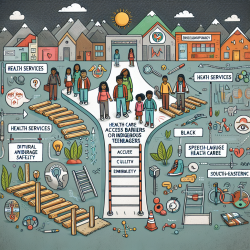Introduction
In the ever-evolving field of speech-language pathology, professionals are increasingly called upon to address not only the clinical needs of their clients but also the broader social determinants of health that impact communication and wellness. A recent study titled "Learning to love ourselves again: Organizing Filipinx/a/o scholar-activists as antiracist public health praxis" provides valuable insights that can be applied to enhance antiracist practices within our field. This blog explores how speech-language pathologists can integrate these findings into their practice to foster more equitable outcomes for all children.
Understanding Antiracist Public Health Praxis
The research highlights the importance of counterspaces—safe, inclusive environments where marginalized communities can share experiences and collaboratively develop strategies for change. For speech-language pathologists, creating such spaces within educational and clinical settings can empower clients and their families, especially those from structurally excluded groups, to voice their needs and participate in their care actively.
Implementing Counterspaces in Practice
- Create Inclusive Environments: Foster an environment where all voices are heard and valued. This involves actively listening to the experiences of clients and their families, particularly those from marginalized backgrounds, and integrating their perspectives into treatment plans.
- Collaborate with Community Leaders: Engage with community leaders and organizations that represent the diverse populations you serve. This collaboration can provide valuable insights into cultural nuances and community-specific needs, enhancing the relevance and effectiveness of interventions.
- Promote Knowledge Sharing: Encourage the sharing of knowledge and experiences among clients, families, and colleagues. This can be facilitated through workshops, support groups, and collaborative projects that highlight the strengths and resilience of diverse communities.
Advancing Knowledge Production
The study emphasizes the role of knowledge production in advancing antiracist public health praxis. Speech-language pathologists can contribute to this by engaging in research that highlights the unique challenges and strengths of marginalized communities. By documenting and disseminating these findings, practitioners can challenge dominant narratives and advocate for systemic changes that promote health equity.
Encouraging Further Research
While the study provides a framework for antiracist praxis, ongoing research is essential to understand better and address the complex factors influencing health disparities. Speech-language pathologists are encouraged to pursue research opportunities that explore the intersection of communication disorders and social determinants of health, contributing to a more comprehensive understanding of health equity.
Conclusion
By integrating the principles of antiracist public health praxis into their work, speech-language pathologists can play a pivotal role in advancing health equity and improving outcomes for all children. The insights from the study "Learning to love ourselves again: Organizing Filipinx/a/o scholar-activists as antiracist public health praxis" offer a valuable roadmap for creating more inclusive and effective practices.
To read the original research paper, please follow this link: Learning to love ourselves again: Organizing Filipinx/a/o scholar-activists as antiracist public health praxis.










